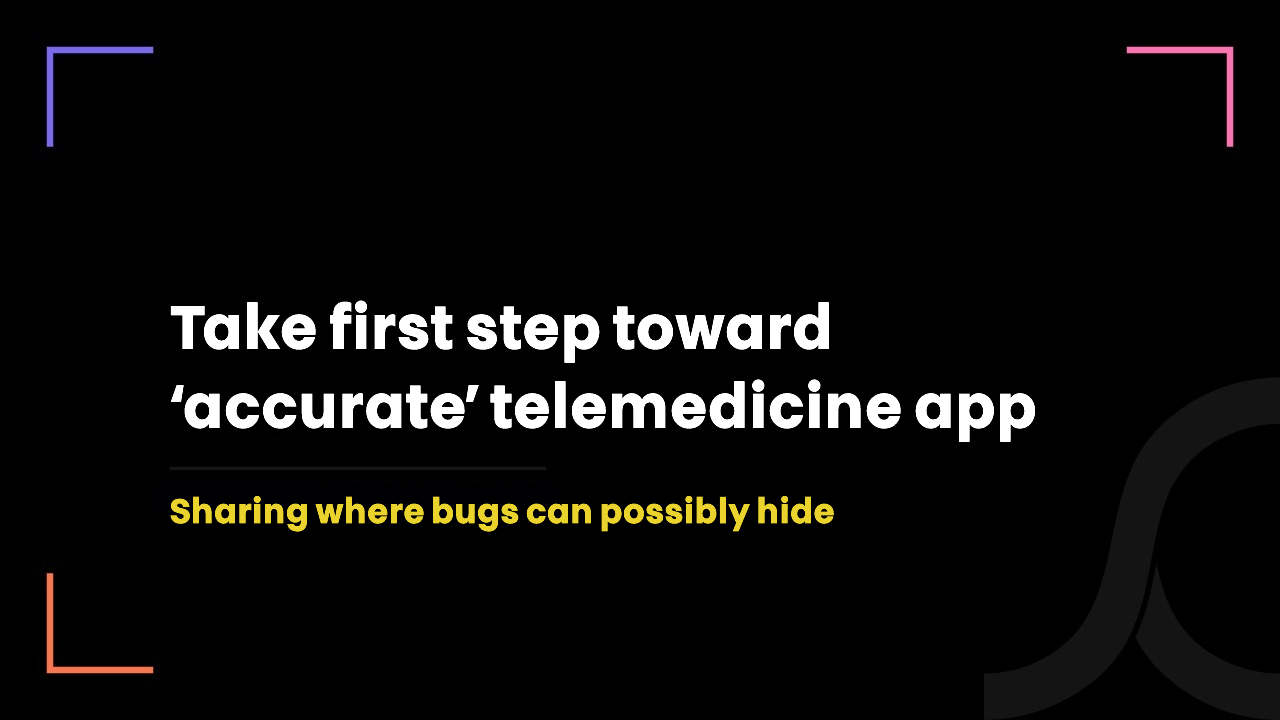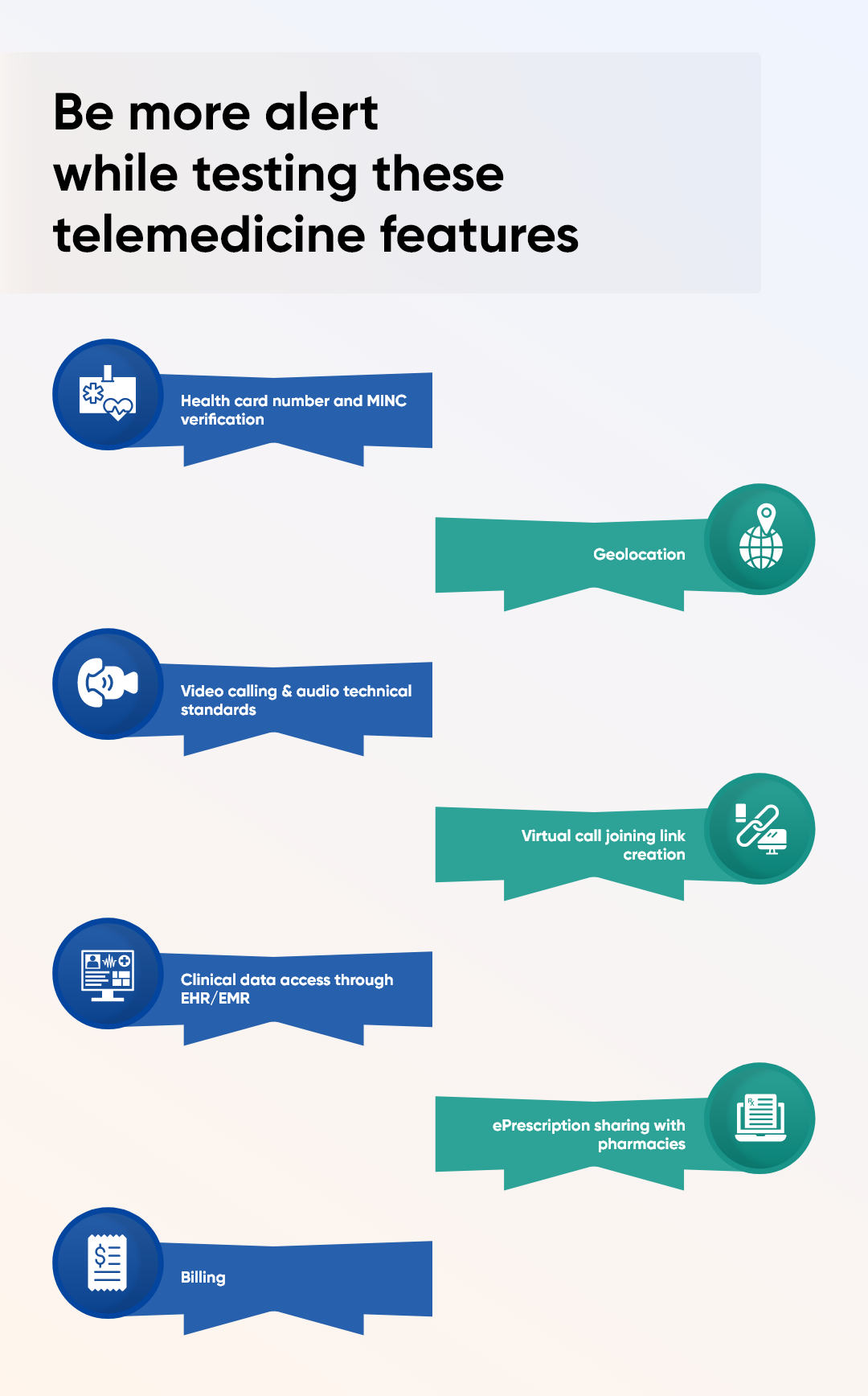Top Error-Prone Telemedicine App Features That Need to Be Tested More Precisely

2 years ago
Oh! Telemedicine again!
We just love writing more and more on telemedicine!
This time, let’s not discuss development, rather discuss the most underrated part of building a telemedicine app which is QA testing.
A Few Basics of Telemedicine App Testing Before We Move Further Into
So, what is telemedicine app testing?
Well, it is nothing but a set of tasks to validate that all features and functionality of a developed telemedicine app are working as per standards.
And who decides the standards?
Of course, you, the owner, business analysts, and QA engineers.
Here is the example, you set a standard that only users aged 18+ can book virtual appointments with a doctor.
So QA engineers make the test case that users aged 18+ are allowed and users aged under 18 aren’t allowed to create accounts.
Based on this test case, they test whether your telemedicine app is successfully verifying the age of the users or not. If yes, there is no bug in this particular feature.
Last but not least, how do QA engineers test the telemedicine web/mobile app?
With manual testing or automated testing approach.
In manual testing, they manually test the test case.
In automated testing, they write the script (code) in automated testing software which automatically tests the test cases.
So now that your basic queries are solved, let’s talk about top telemedicine app features that are most vulnerable to errors and, thus need to be tested precisely.
Most Error-Prone Telemedicine App Features that Need To Be Tested More Precisely

- Health card number and MINC verification
If your telemedicine app supports health card-covered televisits, patients must enter their valid health card details which you need to validate.
But to validate health cards, you must integrate 3rd party services (API), and here is where there is a high possibility of bugs.
So, you must test how your telehealth app calls API and validates the health card details and what happens if someone adds the wrong health card details.
Same way, you must also validate the MINC of physicians and other doctors who register themselves on your telemedicine platform as service providers.
- Geolocation
If your telemedicine app supports in-person appointment booking with nearby doctors, you must test geolocation as well.
You also need to test geolocation when you want to share ePrescription directly to nearby pharmacies for pick-up or doorstep delivery.
For testing geolocation features, you must check whether the app can collect location data as per security and privacy standards and how precisely it can utilize that location data to show nearby clinics or pharmacies to patients.
- Video calling & audio technical standards
Telemedicine mobile or web apps are all about video calling between patients and doctors.
So, if there is a glitch in this feature or cannot meet technical standards around video call resolution, screen adaptability, number of supported people in a call, and minimum frame rate, the entire user experience gets damaged severely.
Thus, you must test the video calling and audio experience of your telemedicine app and most importantly, its technical standards and how it would react to abnormal but common events during the live video call.
You also need to perform load testing to make sure it does not crash or lag when there is a group video call or video call with low bandwidth.
- Virtual call joining link creation
Once the appointment is confirmed, the telehealth app automatically creates the joining link for virtual calls. Without this link, both doctors and patients cannot join virtual calls.
Here, you must test whether the app creates the same link for a patient and doctor with whom the patient has booked a virtual care appointment.
You also need to check for how long this link remains active to make sure it does not go inactive before the appointment time.
- Clinical data access through EHR/EMR
This is the most error-prone feature as there are so many interoperability standards around this.
An EHR/EMR needs to be integrated with a telemedicine app to let providers access the clinical data of patients directly from the telemedicine app.
So, here you need to test whether an integrated EHR/EMR can share accurate clinical data in a secure manner or not and what is the response time.
To test this feature, you must take HL7 and FHIR standards into account which makes sure that there is no interoperability issue between your app and EMR/EHR.
- ePrescription sharing with pharmacies
At the end of the virtual call, the physician writes the ePrescription and the app asks patients to select a nearby pharmacy from the list.
As soon as the patient selects the nearby pharmacy, the app automatically sends the ePrescription directly to the PMS (pharmacy management system) of that selected pharmacy.
This feature can only be achieved with PMS integration. So, here you need to test how accurately your telemedicine app and PMS work in an aligned manner in different scenarios.
- Billing
This is another most error-prone telemedicine app feature.
Because, the app needs to do separate billing with unique workflows for patients having health cards, patients having private insurance, and patients having no insurance at all.
For all types of billing, you need to test different test cases.
For instance, if a patient is covered under a private insurance provider, you only need to ask for private insurance details and validate it straightaway.
And if a patient is uninsured, you must let them pay fees either using credit/debit cards or eWallets.
Here too, you must carry out functional, integration, performance, and security testing of the payment gateway.
If we summarize all, there will be hundreds of test cases for testing a billing feature only.
Because, if you let a bug evolve in a billing feature, things go messy, financially!
Need To Get Your Telemedicine App Tested by Healthcare IT Professionals? We’re the Ones!
We're an Ontario-based healthcare-focused tech company that has only been serving the healthcare industry for 8+ years.
With our dedicated healthcare app developers, business analysts, QA engineers, and compliance specialists, we offer healthcare development, compliance, and testing services as a specialization.
Our healthcare-specific knowledge makes us different from others and profitable for you.
In the past, we have built 20+ telemedicine apps with QA testing for Canadian and American providers.
We are proud to say that we delivered them 85% high ROI, clinical value, and peace of mind with automated testing.
So, we’re eager to help you achieve the same or even more while carrying out telemedicine app testing.
